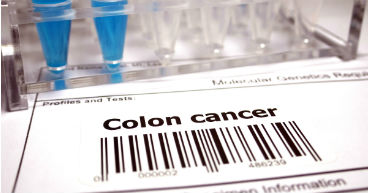
If you have a gut feeling that something may be wrong with your digestive system—especially if that feeling is not just intuition, but pain or other symptoms—it may be a good time to get checked out by your doctor.
One explanation may be that you have irritable bowel syndrome (IBS), a common diagnosis that covers a variety of digestion-related ailments, many of which may be corrected through changes to your diet. However, the symptoms may also be a sign of something more serious, such as colorectal cancer.
There’s no surefire way to tell the difference between IBS, colorectal cancer and some other serious condition from the symptoms alone. IBS and colorectal cancer symptoms may both include:
- Abdominal pain
- Cramping
- Constipation
- Diarrhea
- Changes in bowel movements
- Bloating
- Nausea
- Difficulty swallowing
IBS vs. colon cancer: Symptoms and diagnosis
“All those symptoms put together become a spectrum of symptoms we call irritable bowel syndrome,” Dr. Vashi says. It may take a visit to the doctor and maybe some follow-up tests, including a colonoscopy, to determine whether it’s something more serious.
“We always look for certain warning signs,” Dr. Vashi says. “For instance, if they start showing that they’re losing weight, which is not explained by any other reason, that would be a red flag. Or if they’re starting to see some blood in the stool.”
These additional signs don’t rule out IBS as the culprit, but they increase the possibility that something else may be going on. Other potential warning signs for colorectal cancer—the blanket term for colon cancer or rectal cancer—include:
- Vomiting
- A feeling that the bowel is not fully emptied, or an urge to have bowel movements when not needed
- Stools that are narrower than usual
- Frequent gas pains
- A feeling that you’re full constantly
- Fatigue and weakness
- Anemia (low red blood cell count) from blood loss
“The rule of thumb with any kind of symptom related to your digestive tract—whether it’s abdominal pain, change in bowel habits, blood in the stool, loss of appetite, weight loss, difficulty in swallowing, severe heartburn—if it doesn’t go away within two weeks or so after starting (when it could be related to some infection, virus or something else), you should immediately seek help with your primary care doctor,” Dr. Vashi says. “Let the primary care doctor do the basic workup, do some blood work, maybe some X-rays, do a detailed history and then find out whether this is something significant or not.”
Similar symptoms for other cancers
Colon cancer and rectal cancer are not the only cancers that share symptoms with IBS. Other gastrointestinal cancers, including stomach cancer, esophageal cancer and pancreatic cancer, also cause similar symptoms.
But colorectal cancer is of particular concern because it’s the most common gastrointestinal cancer and the third leading cause of cancer-related deaths in men and women, according to the U.S. Centers for Disease Control and Prevention (CDC).
The earlier colorectal cancer is detected, the better the prognosis for a positive outcome. While the overall five-year survival rate is 65 percent for colorectal cancer patients, the five-year survival rate rises to 90 percent if the cancer is detected before it’s spread, the American Society of Clinical Oncology estimates. Once colorectal cancer has metastasized, or spread to distant organs, the survival rate falls to 14 percent.
Colorectal cancer may not always have symptoms when it develops. It may begin with small growths called polyps on the lining of the intestines that may eventually turn cancerous. One of the advantages doctors have in fighting colorectal cancer is detection through screening by either a colonoscopy or some newer, less-invasive testing, including a fecal immunochemical test (FIT) or fecal DNA testing such as Cologuard®.
“Among all the cancers of the digestive tract, colon cancer is the only cancer that we can prevent or reduce the incidence by doing screening tests,” Dr. Vashi says. “No other real test has been developed for any other GI cancer.”
The U.S. Preventive Services Task Force recently lowered the recommended age to begin screening for colorectal cancer from 50 to 45, using “stool tests, colonoscopy, CT colonography or flexible sigmoidoscopy.” The updated recommendation came in part to an increase in colorectal cancer cases in younger people.
IBS vs. IBD
Some IBS symptoms and colon cancer symptoms also relate to inflammatory bowel disease (IBD). While IBS and IBD may sound similar, inflammatory bowel disease is a very different condition from irritable bowel syndrome and poses significantly greater risk for colon cancer.
The most common IBDs—autoimmune diseases that inflame the gastrointestinal tract—are ulcerative colitis and Crohn’s disease. IBS does not increase the risk of cancer, but the inflammation that comes with IBD may put individuals at greater risk of colon cancer. Patients with IBD may also develop colorectal cancer differently, through microscopic abnormalities called dysplasia, instead of through larger polyps, Dr. Vashi says.
“Those are pre-cancerous cells that are starting to show up in the lining of the colon, in which case this patient is very likely going to develop colon cancer,” Dr. Vashi says. “For many of those patients, we recommend removal of their whole colon before they develop colon cancer, if they’re starting to show a lot of high-grade, abnormal pre-cancerous cells.”
Colon cancer risk factors
Multiple factors, including some that are out of their control, may put people at greater risk of colorectal cancer. People are at greater risk if they:
- Have a family history of colorectal cancer
- Have a personal history of colon polyps or colon cancer
- Have an inherited condition, including Lynch syndrome or familial adenomatous polyposis (FAP)
- Eat a high-fat diet and a lot of processed meat or red meat
- Do relatively little exercise
- Are age 50 or older
- Are overweight
- Smoke tobacco
- Drink moderate to heavy amounts of alcohol
- Have diabetes
- Have been exposed to radiation in the abdominal area, such as from previous cancer treatments
Don’t ignore warning signs
Symptoms should always be taken seriously, Dr. Vashi says, even among people who might otherwise write them off as part of their irritable bowel syndrome.
“Some IBS patients, many times because of constipation, they have a little bleeding. They presume it’s just hemorrhoids,” he says. “That’s a big mistake. They should never ignore rectal bleeding. It doesn’t matter if it’s from straining and constipation or not.
“I see so many patients that have been having bleeding off and on for six months, eight months, a year, go to the doctor and the doctor says, ‘Oh, it’s just hemorrhoids; you’re too young to have anything else.’ And then after almost a year, they would find some new symptoms and get a colonoscopy done and show they had rectal cancer.”
Dr. Vashi’s take-home message?
“Just because you have IBS, that doesn’t mean you shouldn’t still be alert to the possibility of colon cancer,” he says. “The good news is that most of the patients with irritable bowel syndrome are seeking health care advice or seeing their primary care physician—and their gastroenterologist—more regularly, because that’s how they got diagnosed.”
Concerned about your cancer risk? Try the City of Hope Risk Management Tool.



